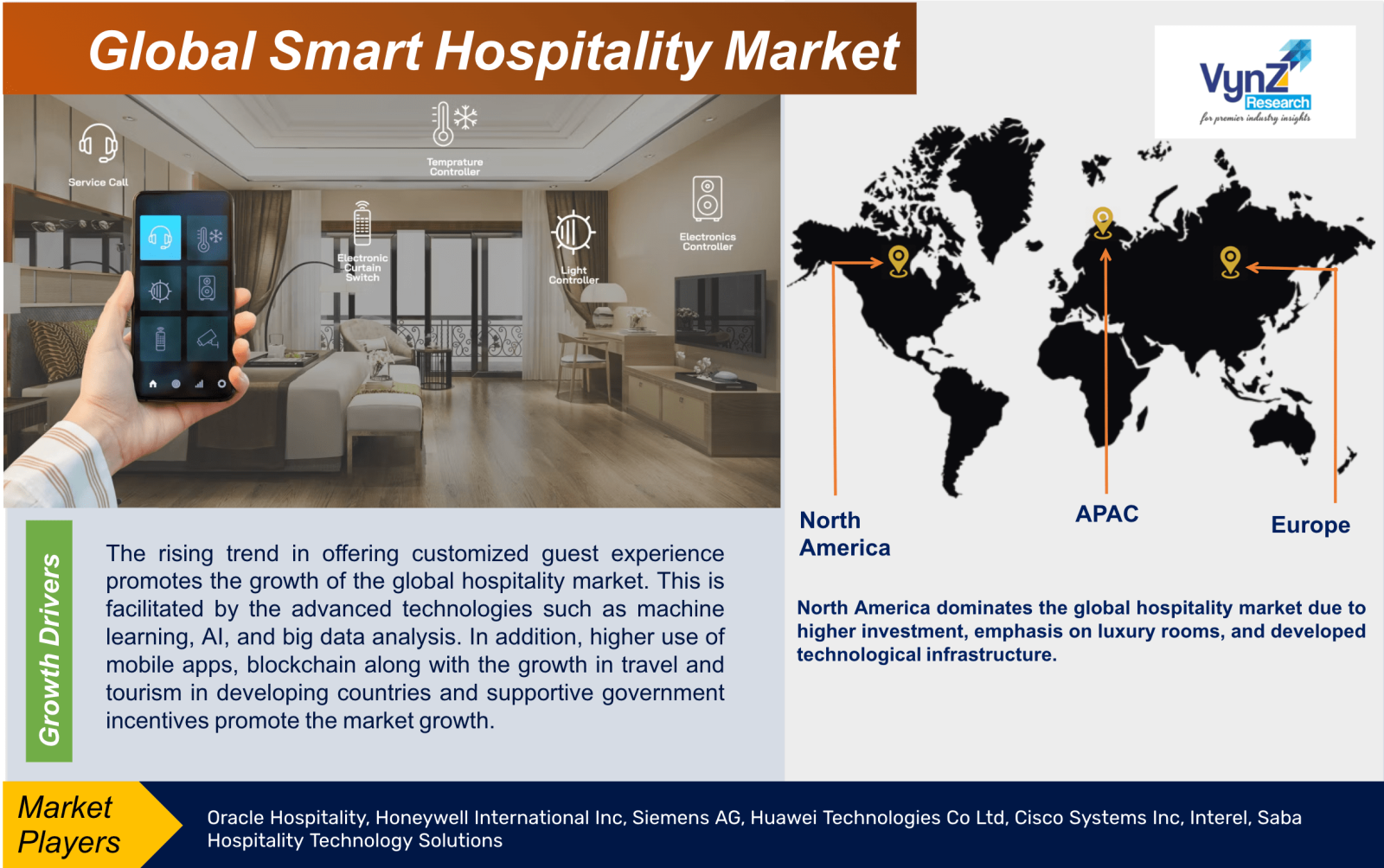| Status : Published | Published On : Jan, 2025 | Report Code : VRICT5192 | Industry : ICT & Media | Available Format :

|
Page : 125 |

Global Smart Hospitality Market Size & Share | Growth Forecast Report 2030
Industry Insights By Offering (Software, Hardware and Services), By Deployment Mode (On-Premises and Cloud-Based), By End Use (Luxury Hotels, Budget Hotels, Resorts, and Other) and By Geography (North America, Europe, Asia Pacific and Rest of the World)
Industry Overview
The global smart hospitality market size was valued at USD 14.7 billion in 2023. It is likely to grow up to USD 57.5 billion by 2030 at a CAGR of 25.8% during the forecast period ranging between 2025 and 2030.
The growth of the market is promoted by the development in IoT technology. Integration of such advanced technology into hospitality services has streamlined operations.

Smart hospitality allows automating energy management, room controls, and other operations that enhance consumer experience and convenience. Advanced technologies are integrated into hospitality services. These technologies such as IoT, cloud computing, and AI improved customer experience and satisfaction due to customization. Smart hospitality is usually found in large resorts and reputed hotels. The primary objective of their inclusion is to promote sustainability and eco-friendly services.
Global Smart Hospitality Market Report Coverage
|
Report Metric |
Details |
|
Historical Period |
2018 - 2023 |
|
Base Year Considered |
2024 |
|
Forecast Period |
2025 - 2030 |
|
Market Size in 2024 |
U.S.D. 14.7 Billion |
|
Revenue Forecast in 2030 |
U.S.D. 57.5 Billion |
|
Growth Rate |
25.8%% |
|
Segments Covered in the Report |
By Offering, by deployment mode and by end use |
|
Report Scope |
Market Trends, Drivers, and Restraints; Revenue Estimation and Forecast; Segmentation Analysis; Impact of COVID-19; Companies’ Strategic Developments; Market Share Analysis of Key Players; Company Profiling |
|
Regions Covered in the Report |
North America, Europe, Asia Pacific and Rest of the World |
Global Smart Hospitality Market Trends/ Growth Drivers:
Growing preference for customized guest experiences
The rising trend in offering customized guest experience promotes the growth of the global hospitality market. This is facilitated by the advanced technologies such as machine learning, AI, and big data analysis. In addition, higher use of mobile apps, blockchain along with the growth in travel and tourism in developing countries and supportive government incentives promote the market growth.
Global Smart Hospitality Market Challenges
High cost of implementation
The cost of implementation smart technology in hospitality services poses significant challenge and hinders the growth of the global hospitality market. Adding to that, cost of necessary training, infrastructural improvements, data privacy concerns limit adoption and growth. Furthermore, unstable connectivity also restricts widespread adoption and growth of the market.
Global Smart Hospitality Market Opportunities
Higher preference among consumers for sustainable services
Rising demand by consumers for eco-friendly services and sustainable practices offer better growth prospects to the global smart hospitality market. This helps in meeting the set sustainability goals and environmental standards. Also, growth in travel and tourism in developing countries especially and government support also offers significant growth avenues to the industry.
Recent Developments of Key Players
Honeywell acquired Carrier Global Corporation's Global Access Solutions as a strategic move to promote their services in hospitality sector.
Oracle announced the integration of AI into its OPERA Cloud Property Management System to improve merchandising and guest engagement capabilities.
Global Travel and Tourism Market Segmentation
VynZ Research provides an analysis of the key trends in each segment of the global smart hospitality market report, along with forecasts at the regional and country levels from 2025-2030. Our report has categorized the market based on offering, deployment mode and end use.
Insight by Offering
- Software
- Hardware
- Services
Software solutions dominate due to higher demand
The global hospitality market is divided by offering into Software, Hardware, and Services categories. Out of them the software segment is expected to dominate due to higher demand and ability to personalize operations and improve efficiency. Their growth is further facilitated by real-time monitoring, automated interactions, and seamless integration.
Insight by Deployment Mode
- On-Premises
- Cloud-Based
Led by cloud-based solutions due to higher scalability
The global hospitality market is segmented by diverse deployment mode into On-Premises and Cloud-Based Solutions, wherein the latter shows higher growth potential in the forecast period. This is mainly due to higher scalability, cost-effectiveness, and ability to provide updates in real time. These solutions allow for seamless integration of data and centralized control of multiple properties and operations.
Insight by End Use
- Luxury Hotels
- Budget Hotels
- Resorts
- Other
Luxury hotels lead due to higher adoption
According to end use, the global hospitality marketis divided into Luxury Hotels, Budget Hotels, Resorts, and other segments. Out of them, the luxury hotels segment leads the market because smart technologies are used extensively in these hotels to offer top-class service.
Global Smart Hospitality Market: Geographic Overview
- North America
- U.S.
- Canada
- Mexico
- Europe
- Germany
- U.K.
- France
- Italy
- Spain
- Russia
- Rest of Europe
- Asia-Pacific (APAC)
- China
- Japan
- India
- South Korea
- Vietnam
- Thailand
- Malaysia
- Rest of Asia-Pacific
- Rest of the World (RoW)
- Brazil
- Saudi Arabia
- South Africa
- U.A.E.
- Other Countries
North America dominates the global hospitality market due to higher investment, emphasis on luxury rooms, and developed technological infrastructure.
The AsiaPacific region is most prospective due to rapid urbanization, supportive government policies, and growth in tourism.
Europe displays consistent growth due to higher emphasis on energy-efficient and sustainable practices.
Global Smart Hospitality Market: Competitive Insight
- Oracle Hospitality
- Honeywell International Inc
- Siemens AG
- Huawei Technologies Co Ltd
- Cisco Systems Inc
- Interel
- Saba Hospitality Technology Solutions
.png)
Frequently Asked Questions
Purchase Options
Latest Report
Research Methodology
- Desk Research / Pilot Interviews
- Build Market Size Model
- Research and Analysis
- Final Deliverabvle
Connect With Our Sales Team
- Toll-Free: 1 888 253 3960
- Phone: +91 9960 288 381
- Email: enquiry@vynzresearch.com
Smart Hospitality Market
